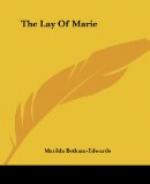Where are the
plaudits, warm and long,
That erst have follow’d
Marie’s song?
The full assenting, sudden,
loud,
The buz of pleasure in the
crowd!
The harp was still, but silence
reign’d,
Listening as if she still
complain’d:
For Pity threw her gentle
yoke
Across Impatience, ere he
spoke;
And Thought, in pondering
o’er her strains,
Had that cold state he oft
maintains.
But soon the silence seem’d
to say,
“Fair mourner, reassume
thy lay!”
And in the chords her fingers
stray’d;
For aching Memory
found relief
In mounting to
the source of grief;
A tender symphony she play’d,
Then bow’d, and thus,
unask’d, obey’d.
The Lay of Marie
CANTO THIRD.
“Careless alike who
went or came,
I seldom ask’d the stranger’s
name,
When such a being came in
view
As eagerly the question drew.
‘The Lady Osvalde,’
some one cried,
‘Sir Eustace’
late appointed bride,
His richest ward the king’s
behest
Gives to the bravest and the
best.’
“Enchantments,
wrought by pride and fear,
Made me, though mute, unmov’d
appear.
My eye was quiet, and the
while
My lip maintain’d a
steady smile.
It cost me much, alas! to
feign;
But while I struggled with
the pain,
With beauty stole upon my
sight
An inward feeling of delight.
“Long did
the silken lashes lie
Upon a dark and brilliant
eye;
Bright the wild rose’s
finest hue
O’er a pure cheek of
ivory flew.
Her smile, all plaintive and
resign’d,
Bespake a gentle, suffering
mind;
And e’en her voice,
so clear and faint,
Had something in it of complaint.
Her delicate and slender form,
Like a vale-lily from the
storm,
Seem’d pensively to
shrink away,
More timid in a crowd so gay.
Large jewels glitter’d
in her hair;
And, on her neck, as marble
fair,
Lay precious pearls, in countless
strings;
Her small, white hands, emboss’d
with rings,
Announc’d high rank
and amplest wealth,
But neither freedom, power,
nor health.
“Near her
Sir Eustace took his stand,
With manner sad, yet soft
and bland;
Spoke oft, but her replies
were tame;
And soon less frequent both
became.
Their converse seem’d
by labour wrought,
Without one sweet, free-springing
thought;
Without those flashes of delight
Which make it tender, deep,
or bright!
It was not thus upon the sea
He us’d to look and
talk with me!
Not thus, when, lost to all
around,
His haughty kinsmen saw and
frown’d!
Then all unfelt the world’s
controul,—
Its rein lay lightly o’er
his soul;
Far were its prides and cautions
hurl’d,
And Thought’s wide banner
flew unfurl’d.




